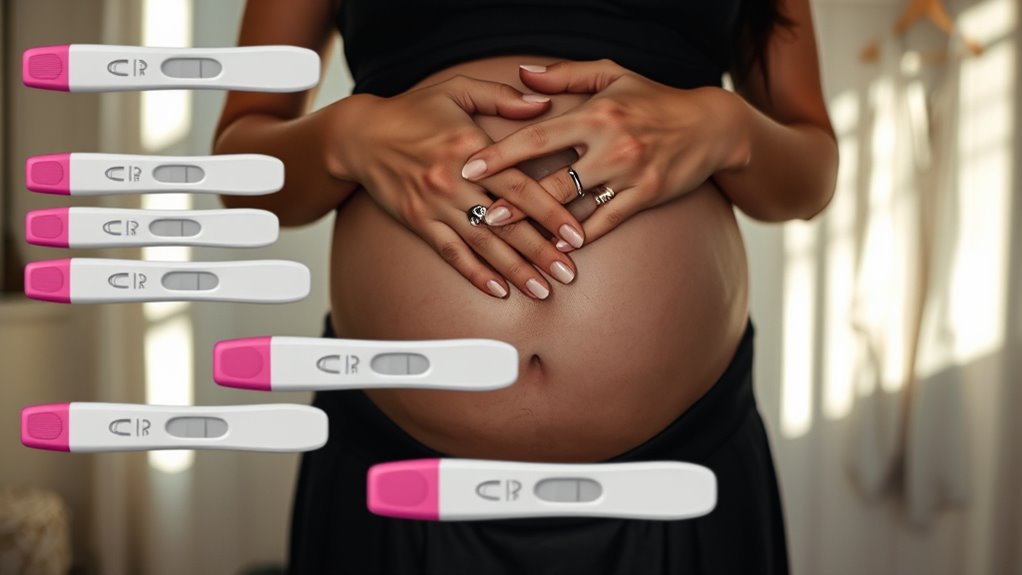False negatives can be really puzzling for you during pregnancy. Testing too early or using less sensitive tests can lead to misleading results. If you test right after a missed period, your hCG levels might not be detectable yet. Also, diluted urine can affect accuracy. Make sure to follow instructions carefully and check the expiration date on your test. Understanding these factors can help you get clarity and peace of mind. There’s more to uncover about this topic.
Key Takeaways
- False negatives can occur if testing is done too early, before hCG levels are detectable.
- The sensitivity of pregnancy tests varies; highly sensitive tests are better for early detection.
- Testing first thing in the morning increases accuracy due to concentrated urine.
- Following test instructions carefully is essential for reliable results and avoiding false negatives.
- If negative results persist, consult a healthcare provider for further guidance and support.

When you’re eagerly waiting to confirm a pregnancy, facing a false negative can be disheartening. It’s frustrating to see that negative result when you’re filled with hope. Often, false negatives happen when you test too early, before your body has produced detectable levels of hCG, the hormone that signals pregnancy. If you take a test just a few days after a missed period, there’s a chance your hCG levels haven’t risen enough to be picked up, leading you to believe you’re not pregnant when you might be.
Another factor is the sensitivity of the test you’re using. Not all pregnancy tests are created equal; some are better at detecting low levels of hCG than others. If you’ve chosen a test that isn’t sensitive enough, it might miss those early levels, resulting in a negative reading. Tests detecting lower hCG levels are more accurate, which means selecting a highly sensitive test could improve your chances of getting a correct result.
You also have to consider the timing of your test. Testing first thing in the morning, when your urine is most concentrated, increases your chances of getting an accurate result. If you’ve consumed large amounts of water beforehand, your urine could be too diluted, reducing the hCG concentration and potentially causing a false negative.
Sometimes, you might even be using an expired or faulty test. If the test is past its expiration date or defective, the antibodies may not work effectively, leading to unreliable results. It’s crucial to follow the instructions precisely to avoid any mistakes that could impact the accuracy of your test.
The emotional toll of false negatives can be significant. You might feel confused and anxious, especially if you’re eager to start prenatal care. Many women find themselves retesting multiple times, which only adds to the stress. If you continue to receive negative results but suspect you’re pregnant, it’s wise to consult a healthcare provider for further testing.
In today’s digital age, you’re likely turning to online resources and communities for support and information during this confusing time. While it’s great to share experiences with others, remember that not all information is reliable.
Seeking guidance from healthcare professionals, combined with the support of online communities, can provide the reassurance and clarity you need. In navigating the puzzling world of false negatives, staying informed and proactive is key to understanding your pregnancy journey.
Frequently Asked Questions
What Are the Common Causes of False Negatives in Pregnancy Tests?
Common causes of false negatives in pregnancy tests include testing too early, using low sensitivity tests, or miscalculating your menstrual cycle.
If you don’t follow the instructions carefully, check results too soon, or use expired tests, you might get inaccurate results.
Additionally, diluted urine from excessive drinking can affect hCG detection.
Conditions like ectopic pregnancies or multiple gestations may also lead to lower hCG levels, resulting in false negatives.
How Soon Can I Take a Pregnancy Test After Conception?
You can typically take a pregnancy test about 6-10 days after conception, which is when hCG starts to be produced.
If you’re using a more sensitive test, you might test as early as 6-8 days post-ovulation.
However, for the most accurate results, it’s best to wait until after your missed period.
Can Medications Affect Pregnancy Test Results?
Yes, medications can affect pregnancy test results. Some drugs, like certain fertility treatments, can cause false positives, while others, such as diuretics and antihistamines, might lead to false negatives.
If you’re taking medication, it’s crucial to consult your healthcare provider before taking a test. Always read labels for potential interactions and follow testing instructions carefully to ensure accurate results.
Retesting or opting for a blood test may also be wise if results seem questionable.
How Can I Confirm My Pregnancy After a False Negative?
You stand in the soft glow of dawn, cradling a pregnancy test that’s shown you a negative result, but uncertainty lingers.
To confirm your pregnancy, wait three days and test again, preferably in the morning when your urine’s most concentrated.
You might also consider a more sensitive test or consult your healthcare provider.
If your period’s still absent, don’t hesitate to seek professional advice—your peace of mind’s worth it.
Are Home Pregnancy Tests as Reliable as Lab Tests?
Home pregnancy tests can be quite reliable, often boasting a 99% accuracy rate when used correctly.
However, they’re not as precise as lab tests, which measure hCG levels in your blood. If you test too early or don’t follow instructions, you might get inaccurate results.
For the most dependable confirmation, consider a blood test through a healthcare provider, especially if you suspect you’re pregnant and want earlier detection.
Conclusion
In the whirlwind of pregnancy, navigating false negatives can feel like trying to find Wi-Fi in a cave. It’s frustrating and often leaves you second-guessing. Remember, it’s essential to stay calm and seek clarity from your healthcare provider. Trust your instincts, and don’t let a single test dictate your journey. Each pregnancy is unique, and there’s no one-size-fits-all. Embrace the uncertainty, and know you’re not alone in this experience. You’ve got this!









